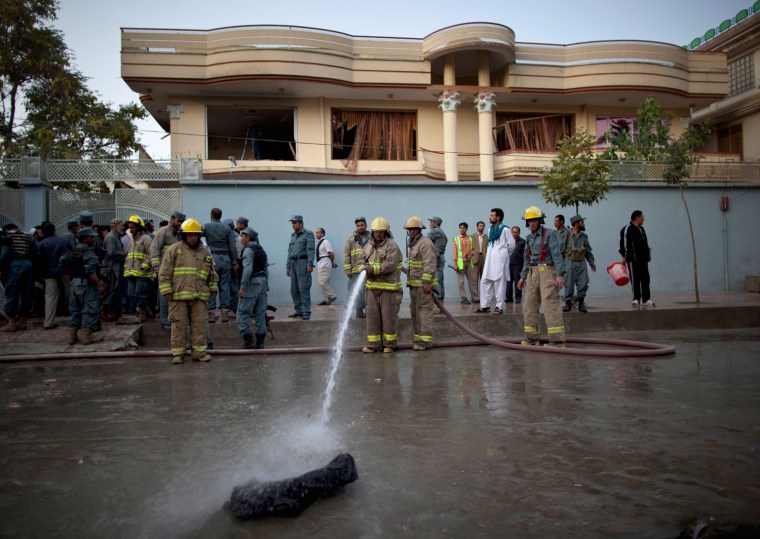U.S. Gen. John Allen took over command of American and coalition forces in Afghanistan from Gen. David Petraeus Sunday, hours after insurgents killed another member of President Hamid Karzai's inner circle.
Allen said he planned to "maintain the momentum" of the international military campaign. He also said that he expected "tough days" ahead.
Allen was promoted to a four-star general shortly before the handover ceremony Monday morning in the Afghan capital.
Also on Monday, NATO said three service members had been killed in the east of the country. No further details were immediately available.
On Sunday, gunmen strapped with explosives killed a close adviser to President Hamid Karzai, Jan Mohammed Khan, and a member of parliament in the latest high-profile insurgent strike against those close to the Afghan leader.
The killing came hours after the beginning of a long-promised transition process from foreign troops to Afghan control, and days after the killing of Ahmad Wali Karzai, the president's half-brother and the most powerful man in Kandahar.
"This is another blow," a senior Western diplomat, who asked not to be identified, told Reuters soon after the attack on Khan's house in western Kabul on Sunday night, which also killed parliamentarian Mohammed Ashim Watanwal.
Security forces quickly killed one of the assailants, but the second attacker barricaded himself inside the house and battled police outside.
Afghan troops rushed to secure the area and streets leading to Khan's home were cordoned off, with electricity shut down, witnesses said.
The crackle of gunfire and small explosions finally ended about 3 a.m. Monday morning and reporters on the scene saw a body — presumably that of the final attacker — dragged out of the house on a plastic sheet. One police officer also was killed, according to the Interior Ministry.
The Taliban claimed responsibility for the attack.
"In this operation two suicide bombers were involved," Taliban spokesman Zabihullah Mujahid said in a statement, claiming some of Khan's bodyguards were also killed. He accused Khan of helping "the Americans and committing atrocities against the Afghan people."
Previously, Islamist insurgents in Afghanistan have rarely attacked at night, although in the past 12 months they have sought to show an ability to adapt their tactics after NATO-led forces made significant tactical gains in the south in the past 18 months.
Political vacuum
Wali Karzai's killing left a dangerous political vacuum in the Taliban's heartland in the south and sent a chilling warning to other political leaders about the reach of the Taliban.
Violence has spiked across Afghanistan in the past year even as NATO-led troops made gains against insurgents in the south, with civilian and military deaths at record levels.
Even as their strength has been diminished, Taliban and other insurgents have shown a remarkable adaptability, changing their tactics despite significant losses.
Barely three weeks ago, up to nine Taliban gunmen and suicide bombers killed 12 people in a night-time attack on Kabul's Intercontinental Hotel, a raid lasting five hours that ended only when NATO helicopters counter-attacked.
The attacks on high-profile Afghans and other targets also came days after a U.N. report found that the first six months of 2011 had been the deadliest six months for civilians since the Taliban were toppled by U.S.-backed Afghan forces in late 2001.
Transfer of security
Afghanistan began on Sunday a gradual transfer of security responsibility from foreign forces to Afghans, with a low-key ceremony held with little fanfare in the relatively safe province of Bamiyan.
Bamiyan is one of seven areas that will be handed to Afghan forces in the first phase of a process that will end with all foreign combat troops leaving Afghanistan by the end of 2014.
Afghan ministers flew to central Bamiyan province, one of the most peaceful places in Afghanistan, for a ceremony that was not announced in advance, did not run live on any TV channel and to which few media outlets were invited.
After foreign officials were flown out by helicopters, Afghan dignitaries were left stranded in Bamiyan for the night after the aircraft designated to return them home broke down, a senior security source said.
The Taliban have threatened to target transition events, and attacks have been a serious security concern for weeks. Sunday's ceremony finished without any incidents.
New Zealand forces handed responsibility for Bamiyan over to Afghan police, marking the first official step in the process.
'Who's next'?
The change is critical to Afghanistan's long-term security at a time when Western nations are wearying of the cost in lives and cash of the near decade-long war, both the Afghan government and its Western backers say.
"The start of transition is the first step in Afghan forces and Afghan people taking care of their own destiny," said Waheed Omer, spokesman for Karzai.
Bamiyan was in the public eye in 2001 when the Taliban blew up two giant Buddhist statues that were nearly 1,500 years old, triggering complaints from around the world.
Karzai did not attend the ceremony. Key ministries, the commission in charge of transition, and the NATO-led International Security Assistance Force sought to play down the event, saying it was part of a long process.
"After AWK (Ahmad Wali Karzai)'s assassination, these top ministers are worried about who is next," said analyst Haroun Mir, who welcomed the move towards Afghan control but warned that Bamiyan was not a template for the rest of the country.
"This is the beginning of a new era for the Afghan government, taking on (security) responsibility, but Bamiyan is probably the safest province in the country," he added.
